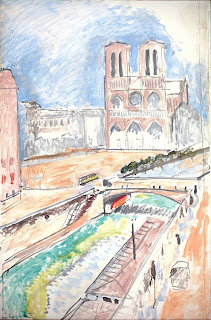In 1949 art critic Clement Greenberg wrote of Matisse “A
self assured master who can no more help painting well than breathing.” Indeed when I look at Matisse’s paintings
they show a confidence and bravado in the brushwork, colorful palette and
composition. It was surprising to learn
that painting never came easy to Matisse who "reworked, questioned and
repainted".
Still Life with Compote, Apples and Oranges by Henri Matisse, 1899
The exhibition “Matisse: in Search of True Painting”, at the
Metropolitan Museum of Art , explores how Matisse used his canvasses as tools,
repeating compositions in order to "compare effect, gauge his progress" and “push
further and deeper into true painting.”
By creating multiple paintings of the same subject matter
Matisse experimented with different techniques to explore the subject. He often copied the same image over and over
varying the treatment of the canvas and handling of the paint.
In his series of paintings of the “Young Sailor” Matisse
used graphite pencil to block in the figure, he followed with black paint to
re-inforece the outline. His final step
was to use vivid paint, allowing it to drip and run, to emphasize the two
dimensional aspect of the surface.
Young Sailor I by Henri Matisse, 1906
Young Sailor II by Henri Matisse, 1906
Young Sailor I by Henri Matisse, 1906
A series of three canvasses of “Le Luxe” dominate the
exhibition. Influenced by Ingres and
Cezanne, Matisse sought to convey the essential qualities of his figures. Using various materials, such as charcoal,
distemper (a water based medium with a matte surface like fresco) and oil, Matisse
created a dramatic series of figure studies that work independently, but when together
create a powerful series that echo the forms of the figures.
Three versions of Le Luxe by Henri Matisse, the first using charcoal, the second in oil and third using distemper, 1907-08
Three versions of Le Luxe by Henri Matisse, the first using charcoal, the second in oil and third using distemper, 1907-08
Another series of paintings by Matisse, highlighted in the
exhibition, are of Notre Dame. They are
based on the view from his Paris apartment. “I never tire of it, for me it is
always new”. The series, as you can see
moves from a traditional view of the cathedral to one that becomes more abstract. These later paintings giving way and
influencing a new generation of artists seeking “true painting”.
Notre Dame by Henri Matisse, 1900
Notre Dame by Henri Matisse, 1914
I highly recommend this exhibition which is at the Metropolitan Museum of Art through March 17, 2013. I also recommend the catalog edited by Dorthe Aagesen and Rebecca Rabinow.
Notre Dame by Henri Matisse, 1900
Notre Dame by Henri Matisse , 1941
I highly recommend this exhibition which is at the Metropolitan Museum of Art through March 17, 2013. I also recommend the catalog edited by Dorthe Aagesen and Rebecca Rabinow.







Wonderful post Marie! You make me want to catch a bus to NYC and spend a day at the Met.
ReplyDelete